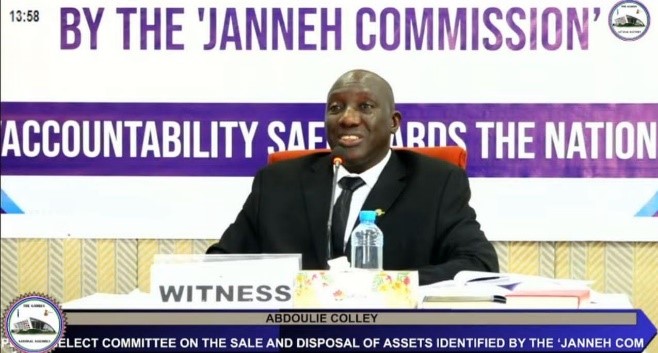By Kebba AF Touray
The Registrar General, Abdoulie Colley, has disclosed that some properties initially identified as belonging to former President Yahya Jammeh and later cancelled were eventually sold to third parties. Mr. Colley made this disclosure on Wednesday, July 23, 2025, while testifying before the National Assembly’s Special Select Committee investigating the assets and financial dealings of the former president.
Colley was questioned extensively by Lead Counsel Aji Sai Kah on the validity and process of cancelling leases and transferring properties previously held by Jammeh and his associates. Referring to his written statement submitted to the committee, Counsel Kah cited a portion where Mr. Colley wrote that “new leases were issued to third parties.”
When asked directly who issued these new leases, Colley responded, “Director of Lands and Survey. Of course, through the Minister for Lands because the Minister of Lands would issue the leases signed by the Permanent Secretary.”
Colley confirmed that his office was aware of the cancelled properties being sold. However, he questioned the legal sufficiency of the cancellation processes initiated through internal memos. “A memo emanating from the Civil Litigation Department does not suffice in cancelling a title registered under the Deeds Registry,” he told the committee.
Counsel Kah pressed him on this point, asking: “So if these cancellations were not in fact valid, does that mean that these properties are still or trying to be sold, but after the supposed cancellation, does that mean that these properties are still being held by the former president and even those that were owned by his associates are still being held under their title?”
Mr. Colley replied, “We cancelled, but technically, I said no… that was not proper.”
He explained that while the memo initiated cancellations, the actual legal grounding came from a government White Paper which accepted the recommendations of the Janneh Commission and vested the properties in the state. “There was a White Paper to that effect and enforcing the orders of the commission, and in essence, the properties are forfeited to the state,” he said.
Colley clarified that the White Paper created the legal authority for any subsequent transactions. “Subsequently, the action can be done, which includes selling of those properties,” he said.
When asked if the memo he referred to preceded the publication of the White Paper, Colley said, “I am not sure about the timelines,” and added, “There may have been a White Paper, but we did not act on it. Or maybe by virtue of that White Paper, the memo was issued. But that, in my view, was superfluous.”
He concluded that “by virtue of that White Paper, the government accepted the memo.”
Counsel Kah asked him whether a White Paper alone is sufficient to cancel title under the Deeds Registry, to which Colley replied, “Yes, we act on it.”
She also questioned him on how he learned that new leases were being issued. Colley explained, “We received correspondence regarding certain properties that we should cancel them, because they are going to issue new leases, and we have provided the correspondence to the committee’s investigators.”
Delving into his supplementary statement, Counsel Kah cited Mr. Colley’s claim that “there are over 100 properties” and asked if he had verified the actual number. Colley responded, “That’s why I said I’ll endeavor to look for the memo, because it is in the memo that the exhaustive list is provided.”
Reading from paragraph 5 of his addendum, Colley stated, “Regarding the commission’s recommendation on properties, I didn’t have a comprehensive list of all the land it acted upon.”
He explained that orders typically come from the Solicitor General’s office. “Specifically, an internal memo was issued by the Director of Civil Litigation and International Law instructing me to cancel over 100 leases,” Colley said. He added, “Possibly more than 125 must be related to provincial or communal lands.”
He clarified that these cancellations carry no legal effect “unless formally endorsed by the authority that originally issued the lease.”
When asked who that authority is, Colley replied, “The leaser of government land, which is the Minister of Lands.”
Counsel Kah asked whether he received any instruction from the Director of Lands and Surveys after the White Paper’s publication. Mr. Colley replied, “Yes, I received a letter request for cancellation, after the White Paper.”
She asked if the directives came all at once or in phases. “I saw one correspondence, but there are almost 13 or 16 properties that we should cancel,” Colley said. When asked to confirm, he replied, “Yes.”
Counsel then asked: “After you received those directives, did you in fact go and cancel?”
Mr. Colley replied, “Yes, we did.”
When asked whether a report was prepared after the cancellation, Colley said, “I think we have provided a response to the Director.”
Finally, Counsel Kah asked whether his office ever received letters or lease copies showing the reassignment of these properties to other individuals or companies. Mr. Colley replied, “I cannot say for certain.”



















